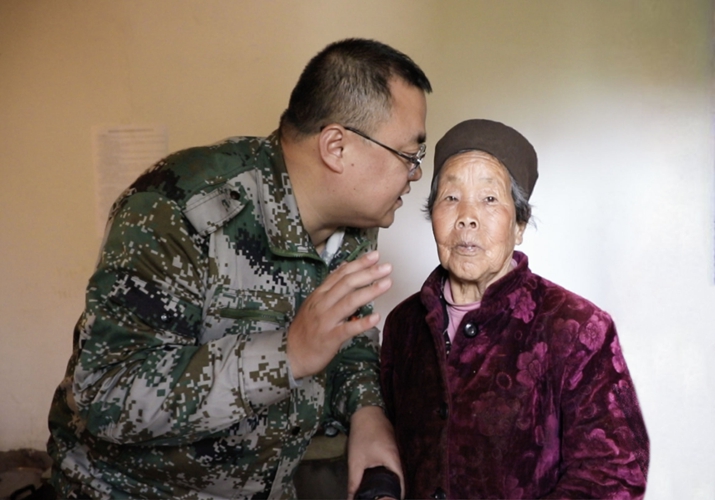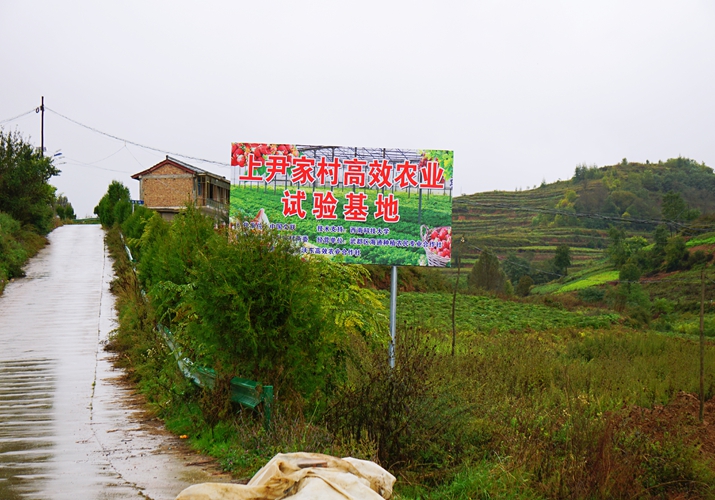Cao Jun (left) and a villager in Shangyinjia Village(XIA YUANYUAN)
With muddy hands and shoes, Cao Jun is intently working with local villagers in a strawberry greenhouse. It's hard to imagine that he was once a suit-wearing government official in China's capital Beijing.
Since leaving the bustle of the big city, Cao, 41, has been serving as village Party first secretary since 2017 in Shangyinjia Village, Longnan City in northwest China's Gansu Province, currently finishing off his second village posting.
Cao is one of 200,000 government workers in China that have been sent to the front lines as "first secretaries" in the campaign to eradicate absolute poverty in rural areas.
The term "first secretary" is specific to China's poverty alleviation program. In early 2015, a program was launched to send this large cohort of government workers to villages to improve rural governance and aid in poverty relief. The government workers were sent mainly to underdeveloped areas to serve as village chiefs. The candidates were selected from a wide range of fields, including government departments, universities, state-owned enterprises and civil associations. The posting period of these first secretaries ranges from one to three years.
Serving the people
In Shangyinjia Village, Cao has been seen as a family member by villagers. Since his arrival, he has promoted the improvement of village roads and the repair of street lights and helped develop the poverty alleviation industry, enabling villagers to have a higher income and enjoy a better quality of life.
After graduating from Peking University in 2000, Cao worked in the China Federation of Literary and Art Circles, in charge of foreign affairs. In 2015, as a support unit, the federation was tasked with selecting officials to help with the poverty alleviation program. Cao was one of the first batch to volunteer.
He said his decision was influenced by his parents who were zhiqing, or "sent-down youth" - young people who were sent to the countryside to learn from the farmers in the 1960s.
"I really wanted to come [to the village], as I felt that I have the passion to do grassroots work," he told ChinAfrica.
During the one-year term, his work and life underwent tremendous changes. Unlike in the past, his regular daily routine now is based on the mantra of "work starts when you open your eyes, and ends when you go to bed."
In 2016, Cao returned to Beijing after completing his posting. However, he has always been concerned about the development of the village. In 2018, when the federation once again stationed officials in the village to help the poor, Cao signed up again and returned to the village.
Today, Cao speaks the local dialect very well, and his busy working schedule is known to every household in the village.
"Only by working together with people, and understanding what the villagers think, can we meet their needs," he told ChinAfrica.
For nearly three years, with support of the federation and local municipal government, Cao changed the old face of the village and helped give it a brand new look. Along with the road upgrade and 80 solar street lamps, a village square was built, providing a place for villagers to gather and socialize, something they are very appreciative of.
Strawberry planting base in Shangyinjia Village(XIA YUANYUAN)
Distinctive industries
In August 2018, agricultural cooperatives from Qingdao, east China's Shandong Province, promoted cherries and strawberries in Longnan. Cao found that Shangyinjia Village, at 2,000 meters above sea level, is very suitable for planting strawberries. This is an industry that can drive farmers' income.
Therefore, he submitted the strawberry industry development plan to the federation. After receiving 530,000 yuan ($78,171) in funds, Cao led the villagers to build three solar powered greenhouses, introduced new strawberry varieties from Shandong Province, and began to experiment with strawberry planting.
After the trial planting was successful, a cooperative was established in the village, which effectively realized the transformation from traditional agriculture to a modern agricultural industry through the transfer of land and labor services.
In March 2020, the first batch of strawberries was harvested with total sales of more than 27,000 yuan ($3,982) and a net income of more than 23,000 yuan ($3,392). Although the strawberry planting was successful, Cao was not satisfied.
"We still have many areas needing improvement. This is the reason why I chose to continue this project this year. I believe we can do better," said Cao.
In 2020, the strawberry industry in the village has once again received 500,000 yuan ($73,746) funding support from the federation, and the base has increased from three greenhouses to six.
Strawberry cultivation gave the villagers a taste of sweet success. Before the establishment of the strawberry planting base, villager Yin Gaoshe's income relied mainly on working in the cities and planting Chinese medicinal herbs and potatoes. Today, planting strawberries can increase his income by about 8,000 yuan ($1,180) a year.
Currently, in Shangyinjia Village, migrant work is still the main way for many villagers to earn money. Cao believes that although it is feasible to go out to urban areas to work, it is not a long-term solution. After all, the labor output is temporary and limited. Only the rational and effective use of rural natural resources is the long-term strategy for villages to become prosperous.
Planning the future
At the end of this year, Cao will finish his second posting in the village, which means he is keen to get as much done as possible and put in place long-term plans for the future development of the village.
"This year we have achieved success in raising seedlings. One strawberry seedling is worth 80 cents ($11.8 cents) and every mu (0.0667 hectares) of land can grow 9,000-10,000 plants. This is a lot of income for the villagers," he said. "In the future, the village can develop in the direction of the entire strawberry industry chain, from seedling cultivation to planting, and to marketing."
"In the village, everyone has given Cao the thumbs up, as he was sincere in doing practical things that improved everyone's life," said Yin.
Although it has only been three years since he first came to Shangyinjia, Cao believes that this method of people-to-people exchange is a rare opportunity to reach the grassroots level and make a real difference.
For him, the experience as first secretary in the village was a valuable life lesson. And for the local villagers, Cao has provided them with a blueprint for rural revitalization.
(Print Edition Title: Success From the Ground Up)
Comments to xyy@chinafrica.cn

